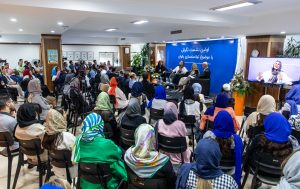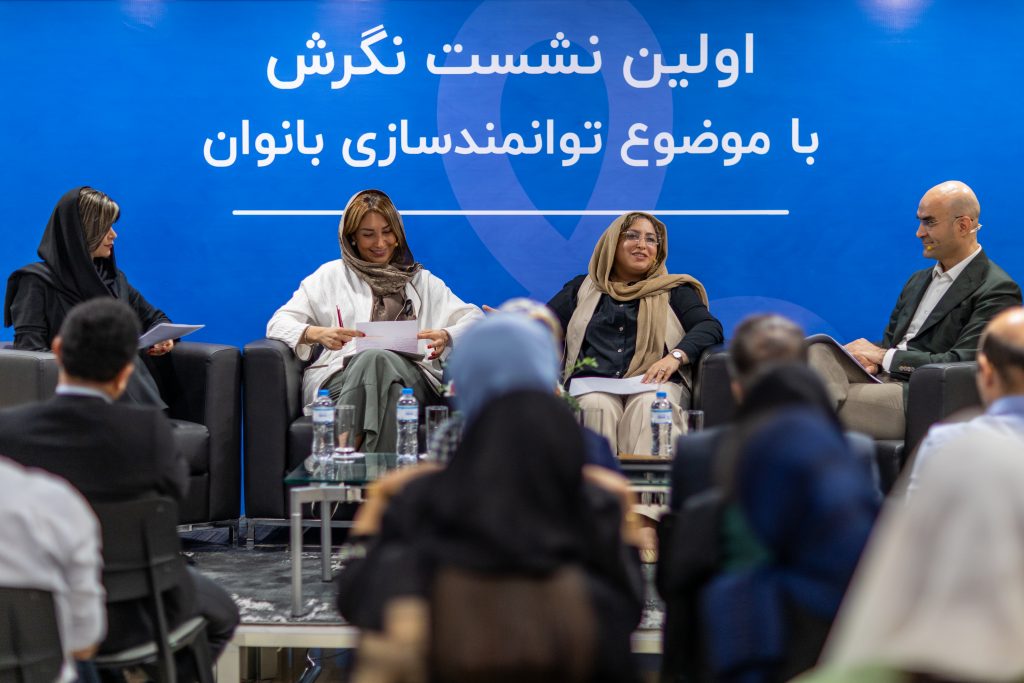On August 21, 2024, the first session of the “Negaresh” series, organized by Dana Energy’s Culture Development Team, was held with the theme “Breaking Stereotypes, Unleashing Potential.” This panel aimed to explore the challenges faced in empowering women and to provide practical solutions and experiences for overcoming these barriers. The event saw the participation of senior managers from various fields and was well-received by Dana Energy colleagues.
The panel was hosted by Sogand Sabourian, Dana Energy’s Culture Development Manager. As one of the principal designers of this initiative, Sabourian played a key role in moderating the discussion and addressing the issues at hand, ranging from gender equality to its impact on organizational progress. Among the distinguished speakers were Elnaz Sakhaeian, Country Manager of Nestlé Iran; Elina Bagheri, Secretary-General of the Exploration and Production Companies Association and CEO of Axone Group, and Davood Asadi, Senior Financial Manager of Dana Energy’s Exploration and Production segment.
The session began with Sogand Sabourian highlighting Dana Energy’s efforts and achievements in gender equality. She emphasized that the lack of equal opportunities not only harms women but also leads to a loss of talent and reduced organizational efficiency. Sabourian cited successful international examples, such as BP and Shell, which have enhanced their productivity by promoting gender balance in management.
Elnaz Sakhaeian, the first female and Iranian Country Manager of Nestlé in Iran, provided an engaging perspective. She openly discussed the challenges she has faced due to her gender and stressed that the main barriers to women’s empowerment are often internal and stem from societal misconceptions and cultural norms. Sakhaeian encouraged women to build self-confidence and break through these stereotypes to demonstrate their capabilities.
Elina Bagheri addressed the cultural and structural obstacles within the oil and gas industry that hinder women’s advancement. She pointed out the prevailing patriarchal culture and the lack of successful female role models as significant barriers. Bagheri stressed the need for cultural shifts within organizations and the creation of successful female role models to enable women to pursue higher management positions confidently. She also recognized Dana Energy’s pioneering efforts in developing female talent within the company.
Davood Asadi emphasized the importance of collaboration and support for women in the workplace. He highlighted that empowering women requires broader societal development and a shift in public attitudes. Asadi proposed designing training and learning programs for women to boost their self-confidence and prepare them for higher management roles.
The panel also featured discussions on managing conflicts arising from the roles of women. Bagheri spoke about the importance of prioritization and delegation in balancing professional and personal life, noting that this aspect is often more pronounced for women. She also discussed the value of quality time in family relationships and recommended using management tools to better coordinate roles and demands.

Sakhaeian shared her experiences managing role conflicts, particularly as a wife and mother. She emphasized the importance of seeking help and dividing responsibilities within the family. She advised women to communicate their needs clearly with their families, a practice that can also foster empathy and understanding in professional settings. She also addressed the issue of unfair judgments and stereotypes, urging women to start with themselves, speak consciously, and avoid incorrect generalizations.
The session concluded with a discussion on practical strategies for empowering women and creating equal opportunities within organizations. Bagheri highlighted the importance of providing equal opportunities and a conducive environment for women’s growth within organizations. She emphasized that, in the absence of management positions, women should actively participate in advisory and policy-making committees to play a more effective role in decision-making.
Asadi stressed the need for a change in organizational attitudes towards women, noting that acceptance of women as equal contributors to development is still not fully ingrained in organizations. He mentioned that this issue is not limited to our country but also persists in developed nations, where glass ceilings continue to restrict women’s progress. He suggested measures such as on-the-job training, job security for women during and after maternity leave, and breaking taboos and negative perceptions regarding women’s maternal responsibilities.
The “Negaresh” panel concluded with a call for cultural and organizational changes to support women’s empowerment. Participants agreed that empowering women is not only a social necessity but also directly contributes to improved organizational performance. The event made one thing quite clear and that is the need for ongoing dialogue and the creation of suitable environments for women’s growth and development in the workplace.
The “Negaresh” series will continue with diverse topics aimed at promoting organizational and cross-organizational synergy, as an ongoing organizational event under development and execution.






We Answer Your Questions